Inhaltsverzeichnis
CBD and children: everything parents need to know
CBD, or cannabidiol, is a non-psychoactive component of the cannabis plant that has gained significant popularity in recent years. Unlike THC (tetrahydrocannabinol), CBD does not cause intoxicating effects and is often touted for its potential health benefits. But what does this mean for children? Is CBD safe for them, and if so, at what dosages?
What is CBD?
Cannabidiol, or CBD for short, is one of over 100 chemical compounds known as cannabinoids found in the cannabis plant. These cannabinoids interact with the body's endocannabinoid system, which plays an important role in regulating functions such as sleep, pain sensation, immune system response, and mood.
Difference between CBD and THC
The most important difference between CBD and THC lies in their effects on the human body. THC binds directly to the CB1 receptors in the brain, resulting in the well-known psychoactive effects. CBD, on the other hand, has a low affinity for these receptors and instead works indirectly by modulating the function of the endocannabinoid system. This results in the numerous therapeutic effects of CBD without the high associated with THC.
Origin and extraction of CBD
CBD is mainly extracted from the hemp plant (Cannabis sativa). Hemp is a special variety of the cannabis plant that contains particularly low amounts of THC (less than 0.3%) but is rich in CBD. The extraction process of CBD can be done in a variety of ways, with CO2 extraction being considered the purest and most efficient method. This process uses carbon dioxide to separate the CBD from the plant, resulting in a highly concentrated and pure end product.
dosage forms of CBD
CBD is available in a variety of dosage forms, allowing users to choose the method of consumption that is most convenient for them. The most common forms include:
- Oils and tinctures : These are dripped under the tongue and quickly absorbed through the mucous membranes.
- Capsules and tablets : A simple and precise method of dosing, similar to traditional dietary supplements.
- Edibles : CBD-infused foods and beverages offer a flavorful way to consume.
- Topical applications : Creams and ointments applied directly to the skin to provide local relief.
- Inhalation : By vaporizing CBD liquids or smoking CBD flowers, CBD can be quickly absorbed through the lungs.
mechanism of action of CBD
CBD interacts with the body's endocannabinoid system (ECS), which consists of receptors, endocannabinoids (the body's own cannabinoids) and enzymes. The two main receptors of the ECS are CB1 and CB2. While CB1 receptors are mainly found in the brain and central nervous system, CB2 receptors are mainly found in the immune system. CBD influences these receptors indirectly and helps maintain balance (homeostasis) in the body, for example by regulating the release of neurotransmitters and anti-inflammatory substances.
Legal Status of CBD
The legal status of CBD varies around the world and is often dependent on the THC content. In most European countries, including Germany, the sale and use of CBD products is legal as long as the THC content is below 0.2%. This has led to the availability of CBD products in pharmacies, health stores and online. In the US, the legal status varies from state to state, with some states having fully legalized CBD while in others it is only available under certain conditions.
Potential Benefits of CBD for Children
1. ADHD (Attention Deficit/Hyperactivity Disorder)
How can CBD help?
ADHD is one of the most common neurobiological disorders in children and can cause significant problems in school and everyday life. Studies suggest that CBD can regulate the activity of certain neurotransmitters in the brain, which can improve concentration and reduce hyperactive behaviors.
Application and dosage
Start with a low dose of about 1-2 mg per day and increase slowly until an improvement in symptoms is observed. Consultation with a doctor is essential to find the optimal dosage.
2. Anxiety and panic attacks
How can CBD help?
Anxiety disorders and panic attacks are common in children and can significantly impact their quality of life. CBD has anxiolytic (anti-anxiety) properties that can help relieve the symptoms of anxiety and panic by acting on the endocannabinoid system and regulating the body's stress response.
Application and dosage
For the treatment of anxiety and panic attacks, it is recommended to start with a low dose of 1-2 mg per day and increase if necessary. CBD drops can be administered sublingually (under the tongue) to ensure rapid absorption.
3. Autism
How can CBD help?
Autism spectrum disorders (ASD) are complex developmental disorders that can cause a variety of behavioral and communication problems. Research suggests that CBD may improve social interaction and reduce behavioral problems by modulating the endocannabinoid system.
Application and dosage
Start with a low dose of 1-2 mg per day and increase gradually. The exact dosage should be determined in consultation with a doctor, taking into account the individual needs of the child.
4. Tourette syndrome
How can CBD help?
Tourette syndrome is a neuropsychiatric disorder characterized by involuntary movements and vocalizations (tics). CBD can reduce the intensity and frequency of tics by affecting neural activity in the brain.
Application and dosage
A low starting dose of 1-2 mg per day may be gradually increased until a significant improvement in symptoms occurs. The dosage should always be adjusted under medical supervision.
5. Chronic pain
How can CBD help?
Children who suffer from chronic pain, whether from illness or injury, may benefit from the pain-relieving properties of CBD. CBD acts as an anti-inflammatory and analgesic by acting on the body's endocannabinoid system.
Application and dosage
Start with a low dose of 1-2 mg per day and increase if needed. Continuous monitoring and adjustment by a doctor is important to achieve optimal pain relief.
6. Epilepsy
How can CBD help?
CBD has been shown to be particularly effective in treating certain forms of epilepsy, especially difficult-to-treat syndromes such as Dravet syndrome and Lennox-Gastaut syndrome. CBD can reduce the frequency and severity of seizures by stabilizing electrical activity in the brain.
Application and dosage
The dosage of CBD for epilepsy should always be done under medical supervision. A typical starting dose is around 2-5 mg per day, which can be adjusted depending on the child's response.
7. Palliative care
How can CBD help?
In palliative care, which focuses on relieving symptoms of serious illnesses, CBD can be a valuable addition. It can help reduce pain, nausea and anxiety, thus improving the quality of life of children in palliative care.
Application and dosage
The dosage should be adjusted individually, starting with a low dose of 1-2 mg per day. Close cooperation with the attending physician is particularly important here.
8. Sleep disorders
How can CBD help?
Sleep disorders are common in children and can have a negative impact on their development and well-being. CBD can help regulate the sleep-wake cycle and improve sleep quality through its calming and relaxing properties.
Application and dosage
A low starting dose of 1-2 mg before bedtime can be gradually increased to achieve the desired effect. Medical advice is also important here to determine the optimal dosage.
9. Hay fever
How can CBD help?
Hay fever, or allergic rhinitis, is an allergic reaction to pollen that causes symptoms such as sneezing, itching, and nasal congestion. CBD may have anti-inflammatory properties and modulate the immune system, which may help relieve the symptoms of hay fever.
Application and dosage
Start with a low dose of 1-2 mg per day and adjust the dosage according to the child's needs and response. Consultation with a doctor is also recommended here.
Is CBD safe for children?
The safety of CBD for children is an issue that needs to be carefully considered. Here are some key points:
-
Studies : While there is promising research, studies on the long-term effects of CBD in children are still limited. Many of the existing studies are small or limited to specific diseases.
-
Side effects : As with any medication, CBD can cause side effects. These include fatigue, diarrhea, and changes in appetite and weight. In rare cases, liver problems have also been observed, especially at higher doses.
-
Drug Interactions : CBD may interact with other medications your child is taking. It is important to consult a doctor before administering CBD to avoid possible interactions.
-
Quality and Purity : The quality and purity of CBD products can vary widely. It is crucial to choose products from trusted manufacturers that provide independent lab reports to ensure the product is free of contaminants and correctly dosed.
Dosage of CBD for Children
The dosage depends on the child’s weight and individual response.
The starting dose is 0.3–0.5 mg per kilogram of body weight.
Dosage increase: The dose can be increased slowly until the desired effect is achieved.
The concentration of the oil should be 5% or 10% for children.
However, it is important to note that the correct dosage of CBD for children depends on several factors, including the child's age, weight, and specific health issues. General guidelines on dosage are difficult to give, but here are some basic considerations:
-
Low starting dose : Start with the lowest dose possible and increase slowly while observing the child's response. A commonly recommended starting point is 0.5 mg of CBD per kilogram of body weight per day.
-
Gradual increase : Increase the dose gradually until the desired effects are achieved, carefully observing possible side effects.
-
Medical Supervision : It is crucial to use CBD in children under medical supervision, especially if the child is taking other medications or has chronic medical conditions.
FAQs 🌿
Is CBD legal for children? Yes, CBD products with a THC content of less than 0.3% are legal in Germany. However, it is important to check the specific legal regulations in your area.
What side effects can CBD have on children? Possible side effects include fatigue, diarrhea, and changes in appetite and weight. In rare cases, liver problems have also been observed.
How do I find high-quality CBD products for children? It is important to make sure to choose products from trusted manufacturers that provide independent laboratory reports. These reports should confirm the purity and accurate dosage of the product.
CALMA CBD
At CALMA, quality and purity are our top priority. Our CBD oils are produced under the highest quality standards for CBD in Switzerland .
In addition, our CBD oils contain 0.0% THC and only two natural ingredients : high-quality MCT oil extracted from coconuts and natural CBD concentrate from Switzerland.
High-quality raw materials: We source our hemp plants from selected, trusted growers in Switzerland who use organic farming methods to ensure a pure and natural source for our CBD. We also use high-quality MCT oil as a carrier oil.
Purity and Transparency: Our CBD oils are thoroughly tested for purity and quality to ensure that they are free from contaminants and pollutants.
Gentle Extraction: We use gentle extraction methods to ensure that the natural properties of the hemp plant are preserved and to obtain a high-quality CBD oil that is complete and effective.
Full spectrum of cannabinoids: Our CBD oils contain the full spectrum of cannabinoids, terpenes and other valuable ingredients of the hemp plant to maximize the so-called entourage effect and offer you the full potential of CBD.
Sustainability: We are committed to environmentally friendly production processes and only produce in Switzerland and Germany in order to avoid long transport routes.
Reasons for CALMA:
➤ Swiss quality
➤ Only 2x natural ingredients
➤ With high-quality MCT oil
➤ Climate-neutral shipping without plastic
➤ Free shipping
🌱 Find out here why more than 100,000 customers trust CBD oil from CALMA CBD: CALMA CBD oils .


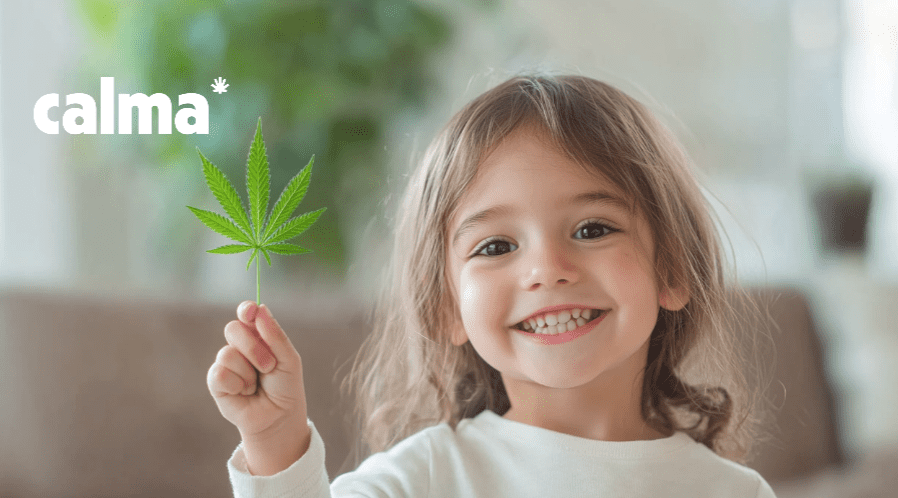
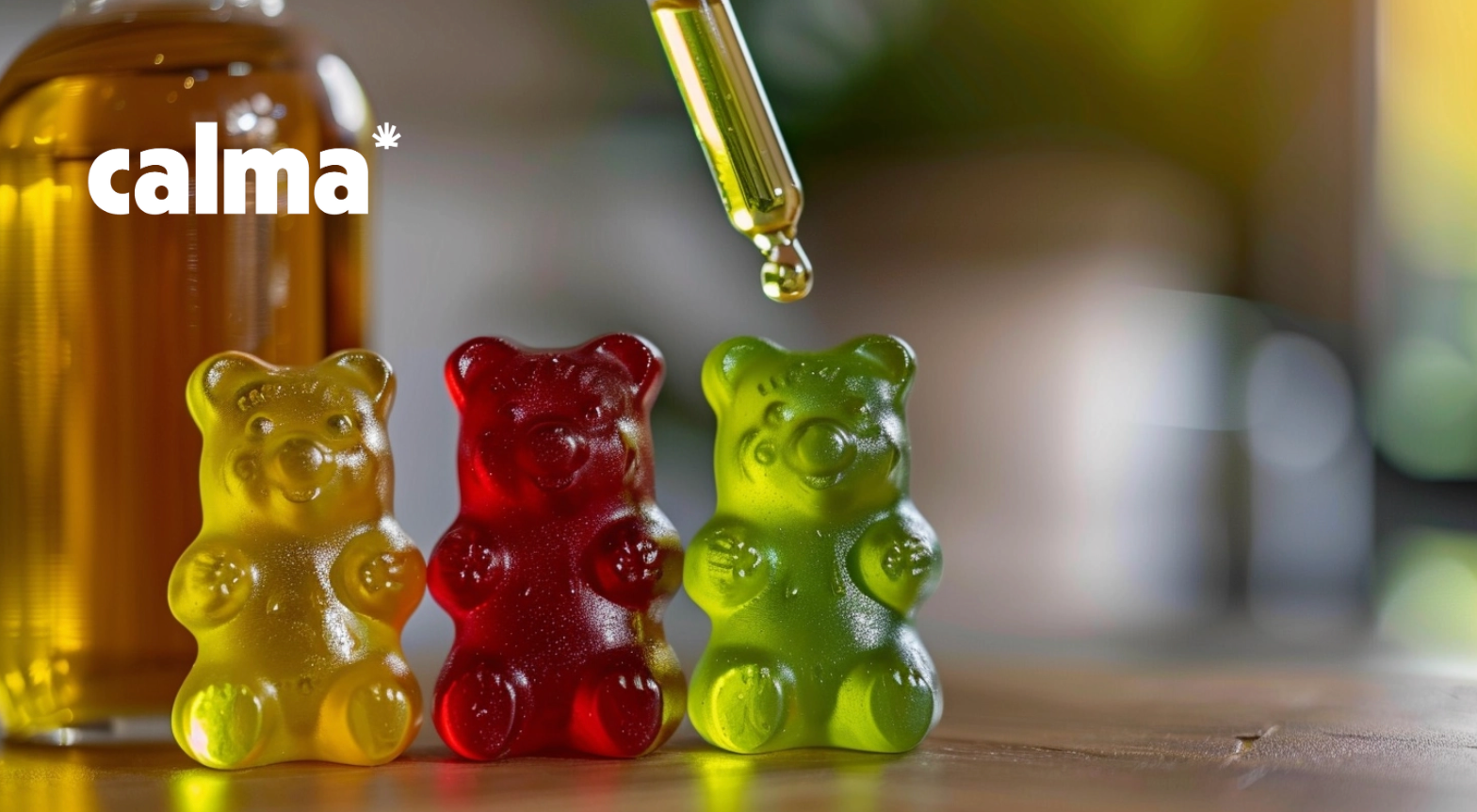
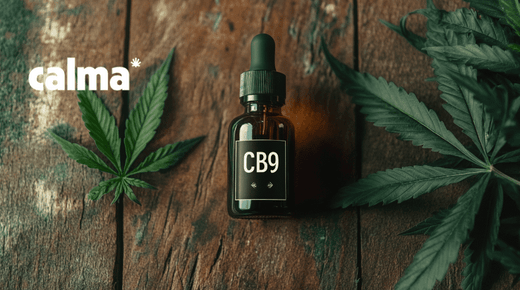

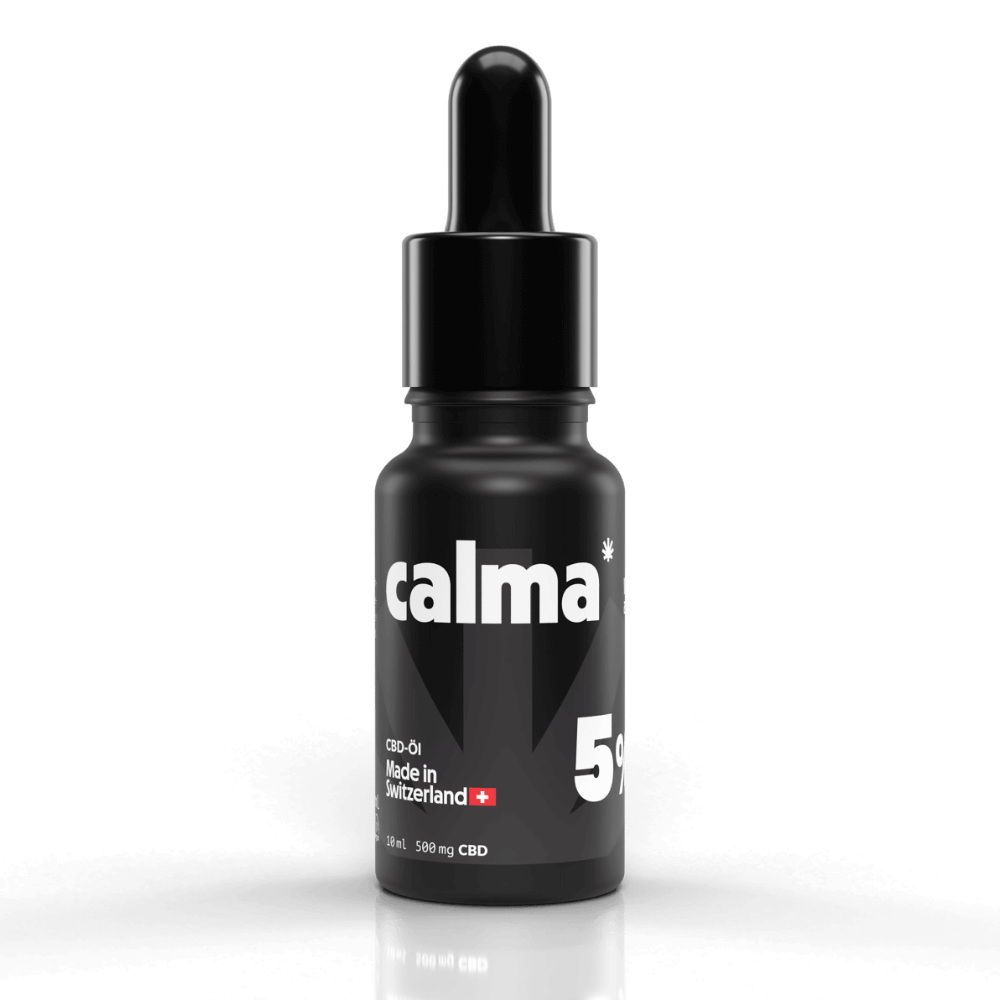
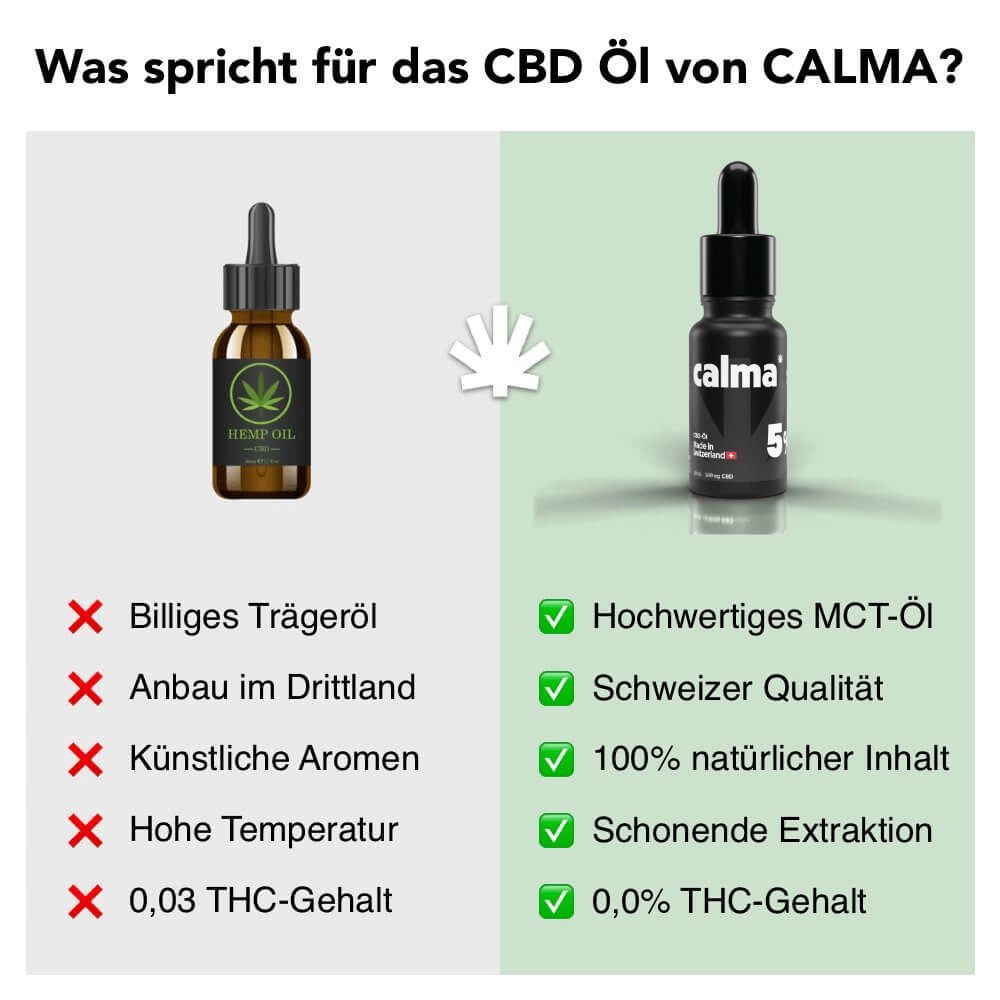
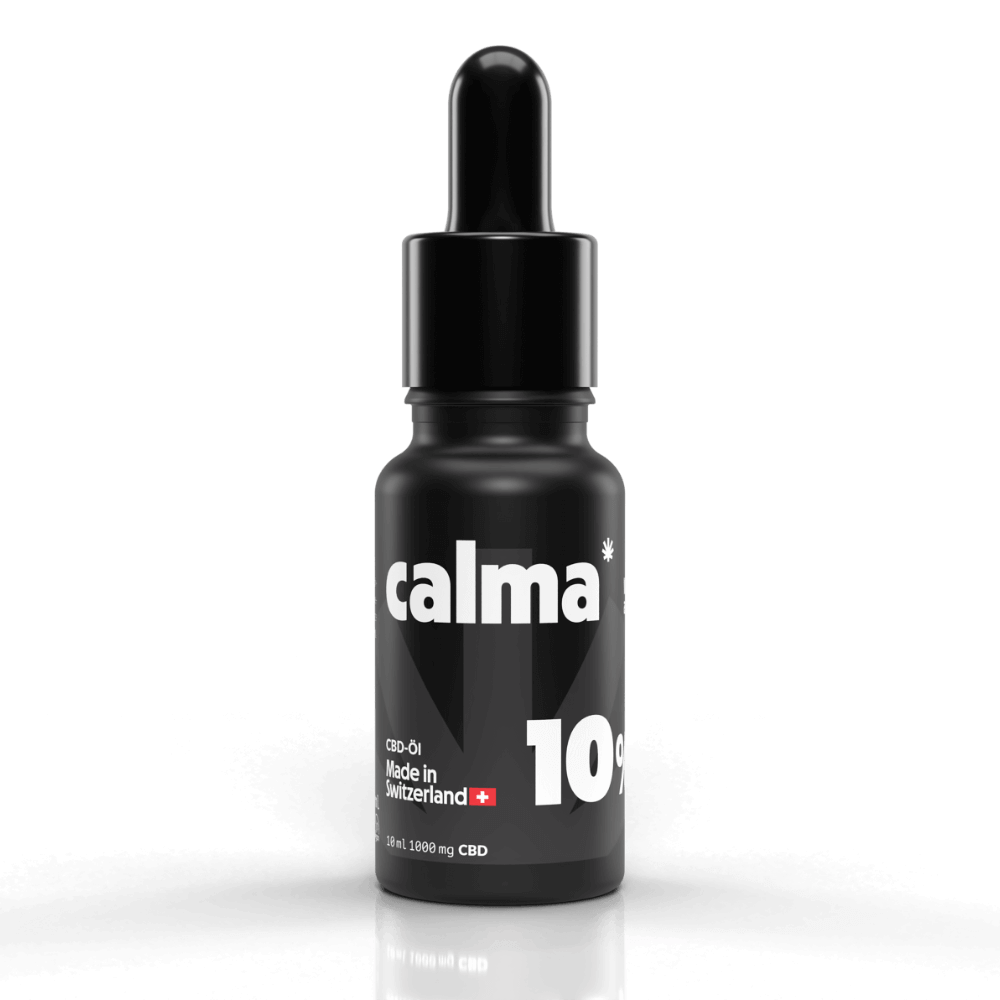
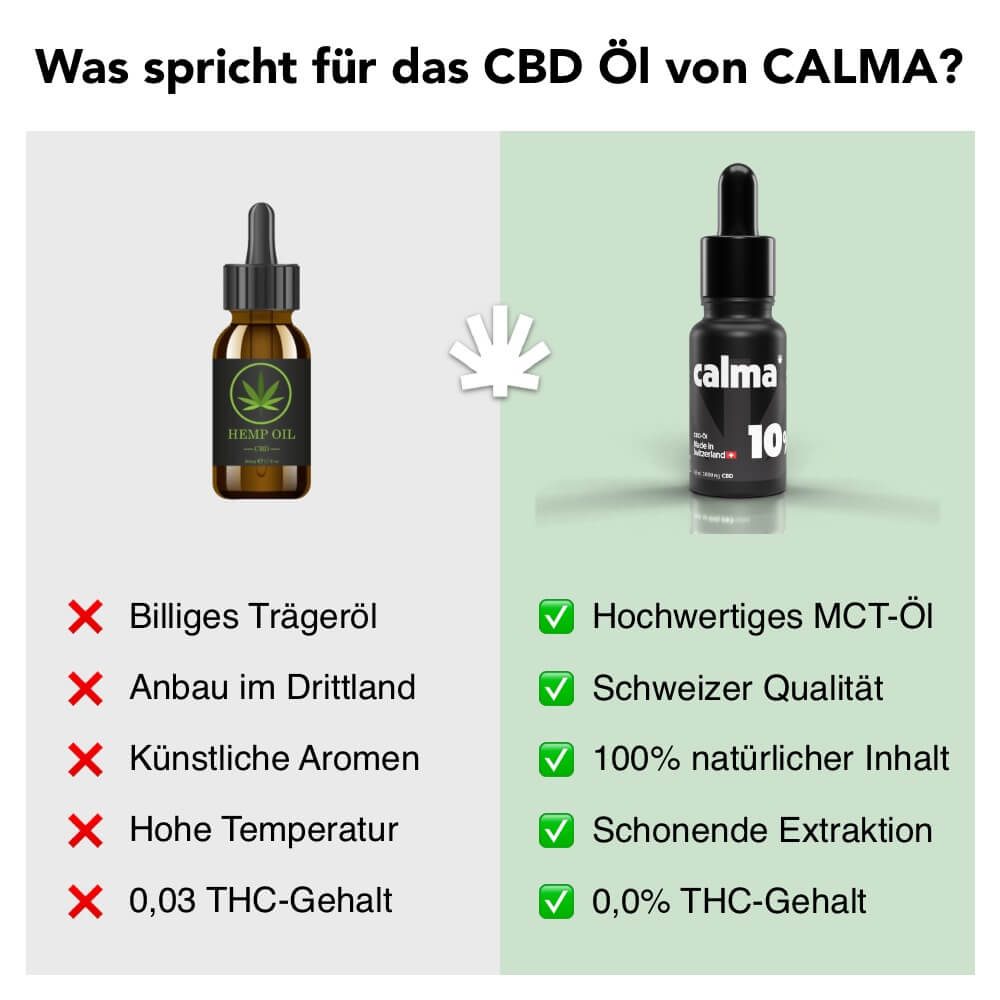
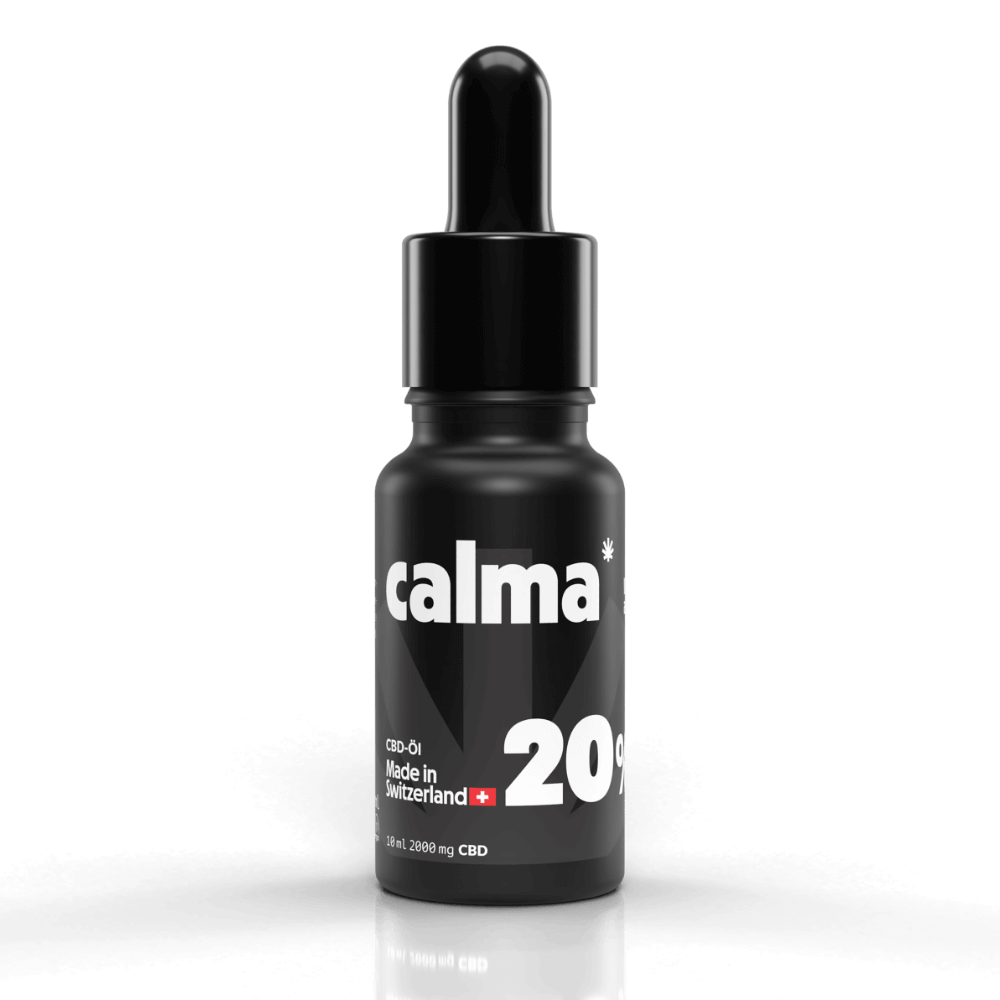
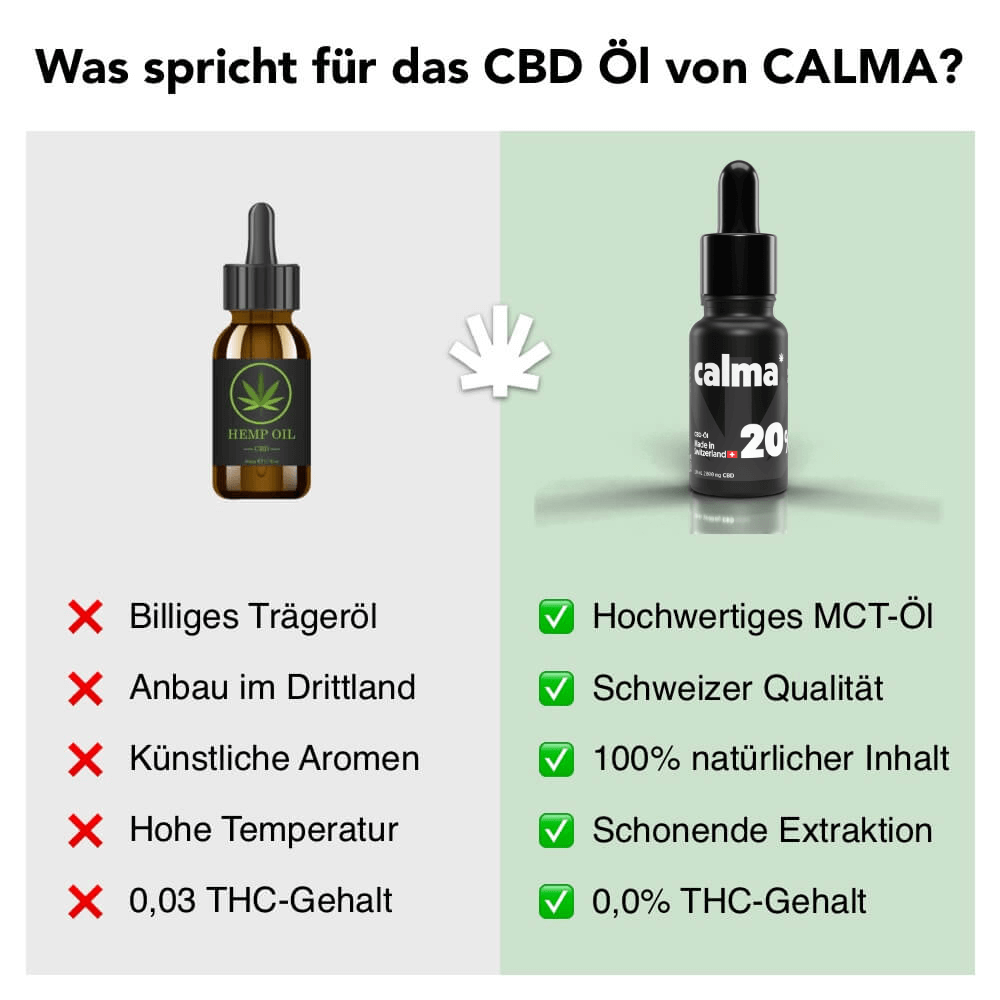
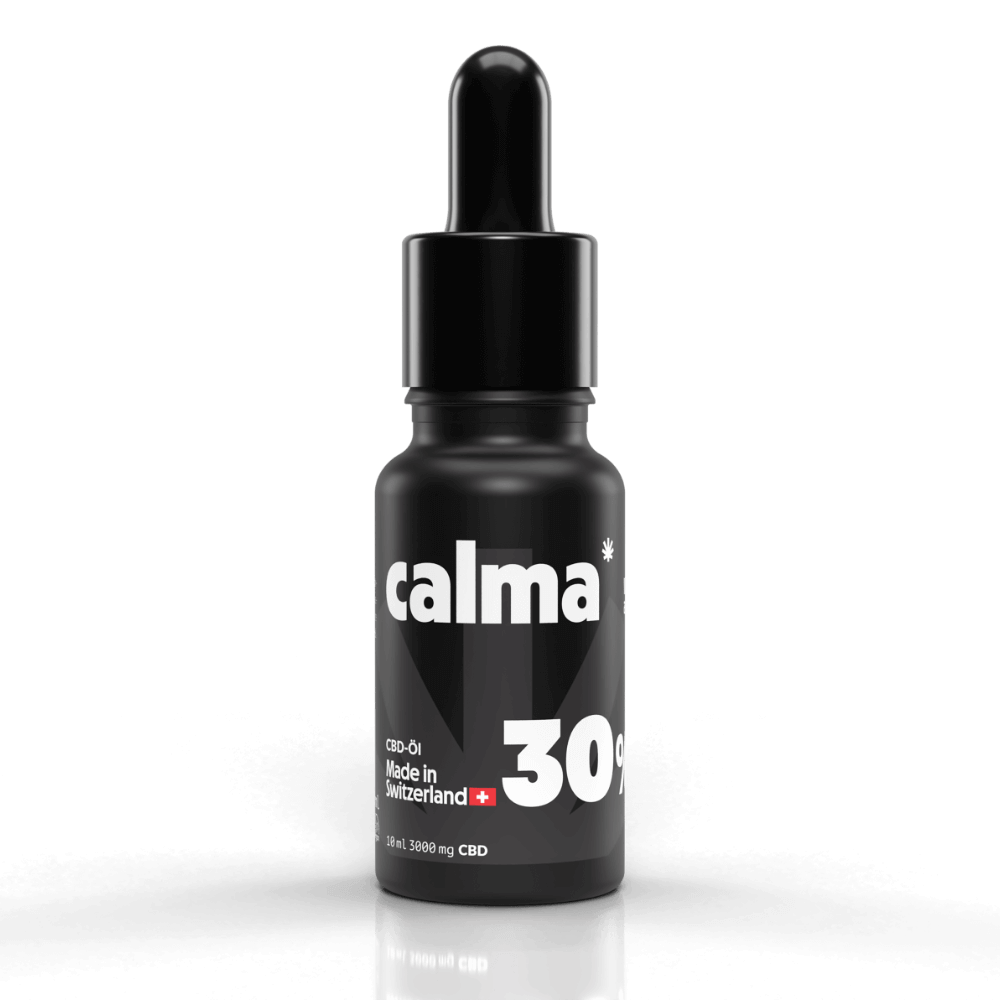
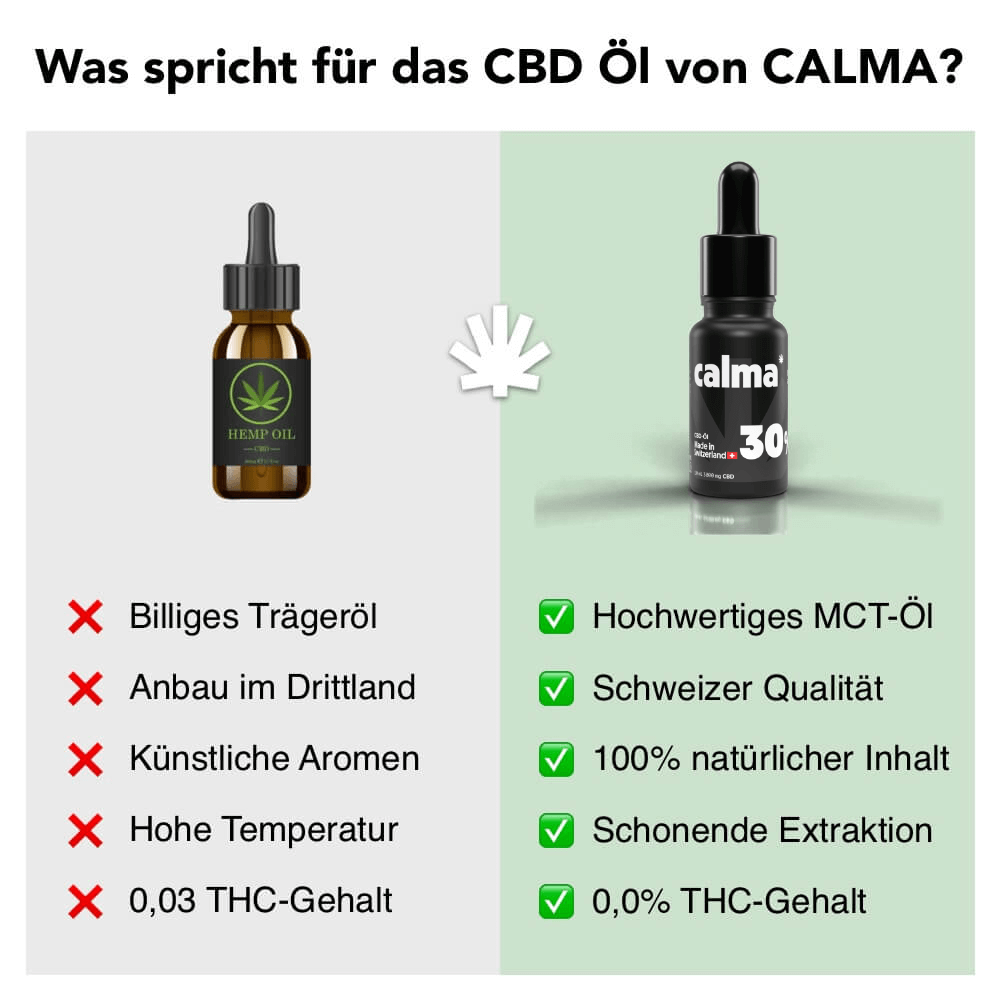
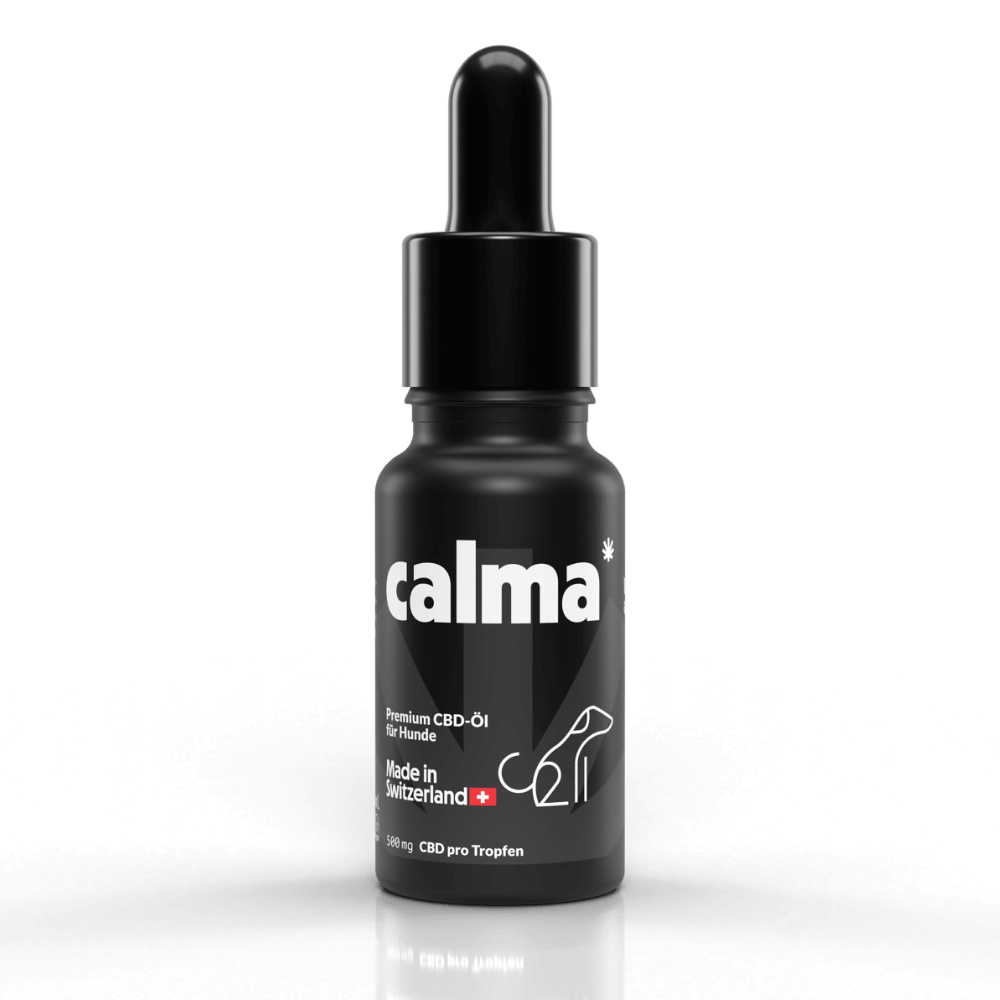
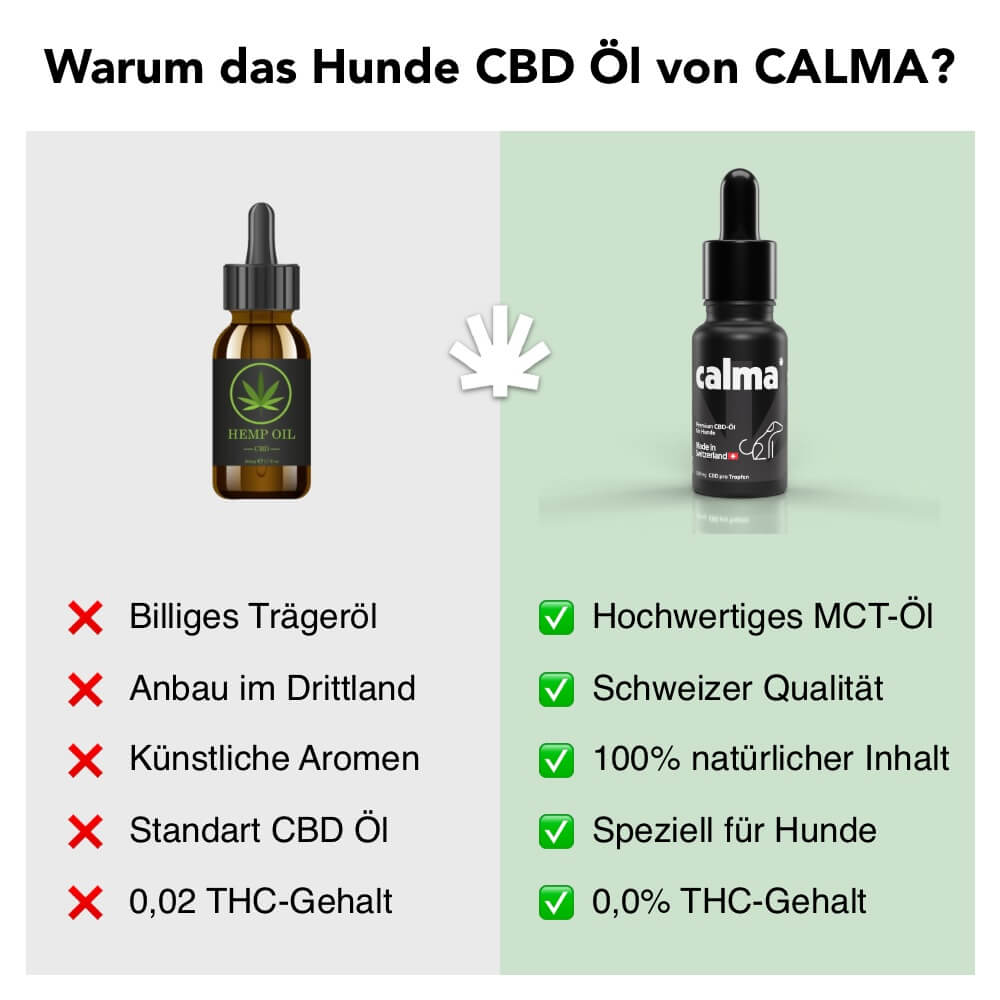
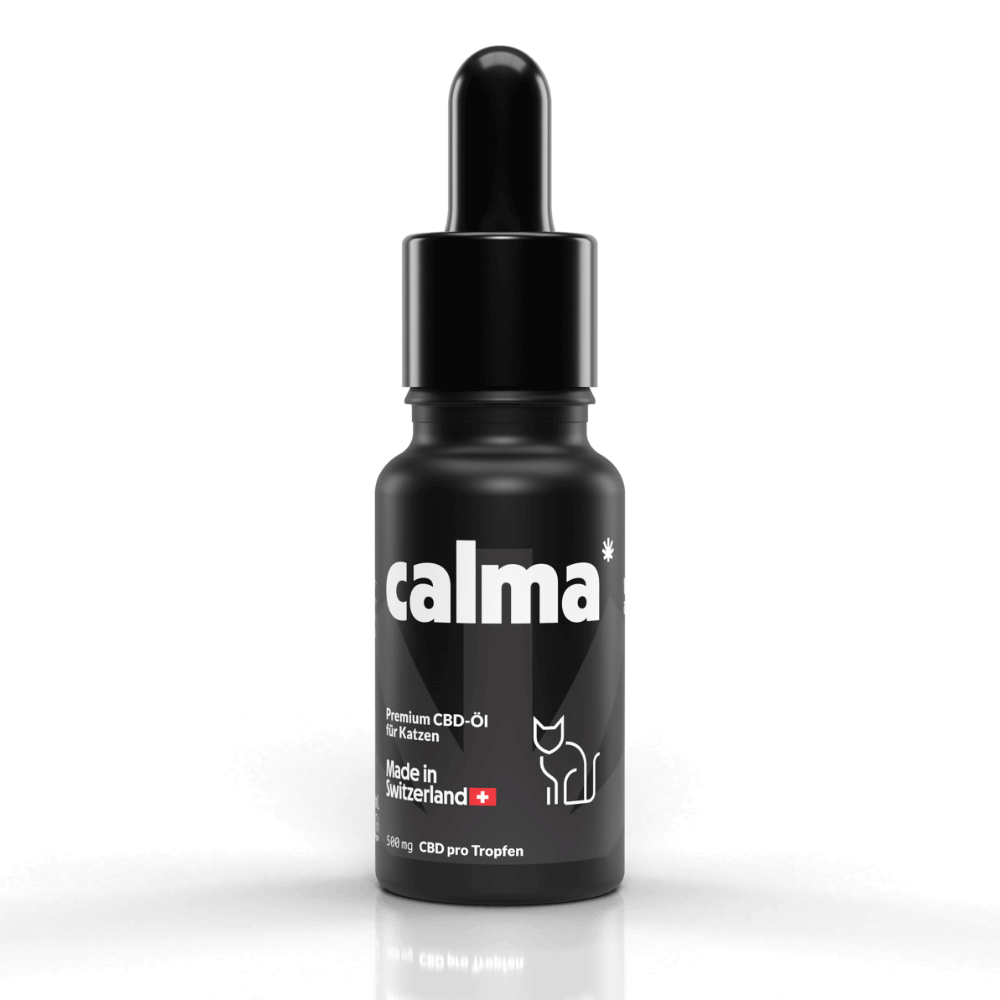
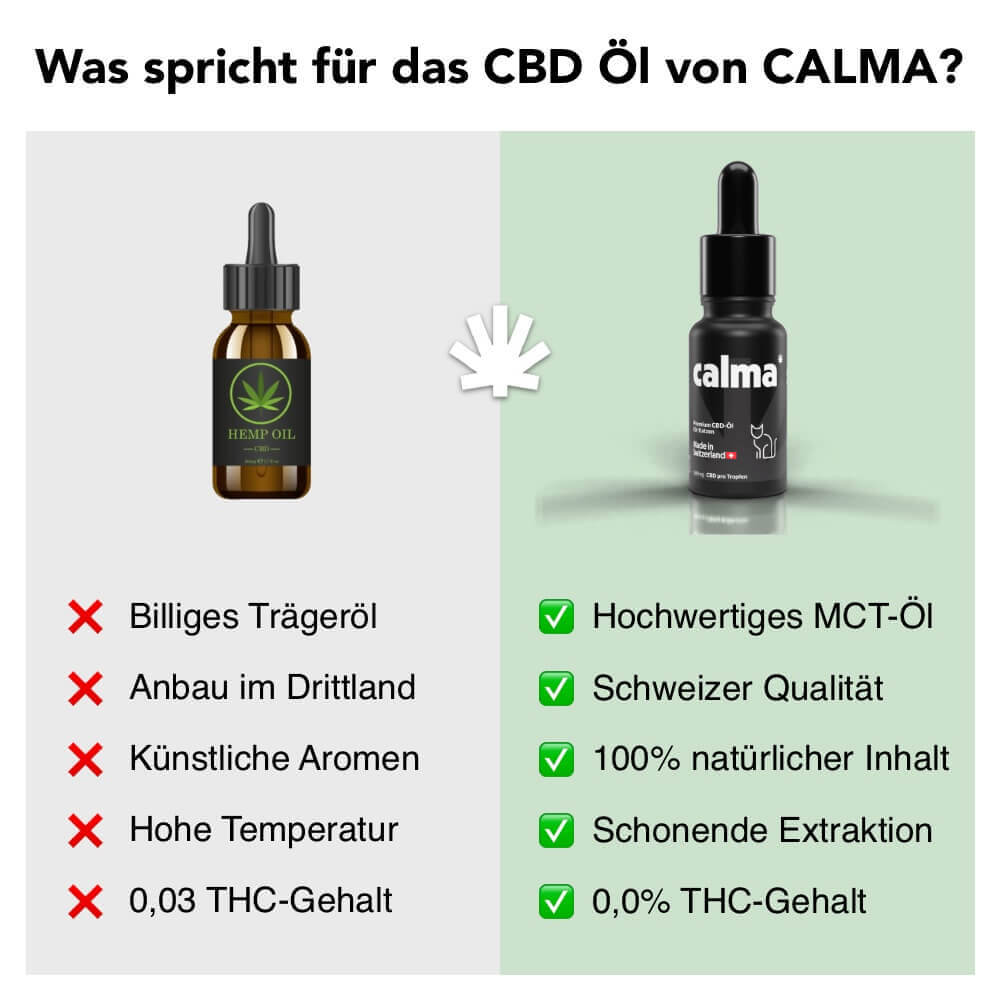
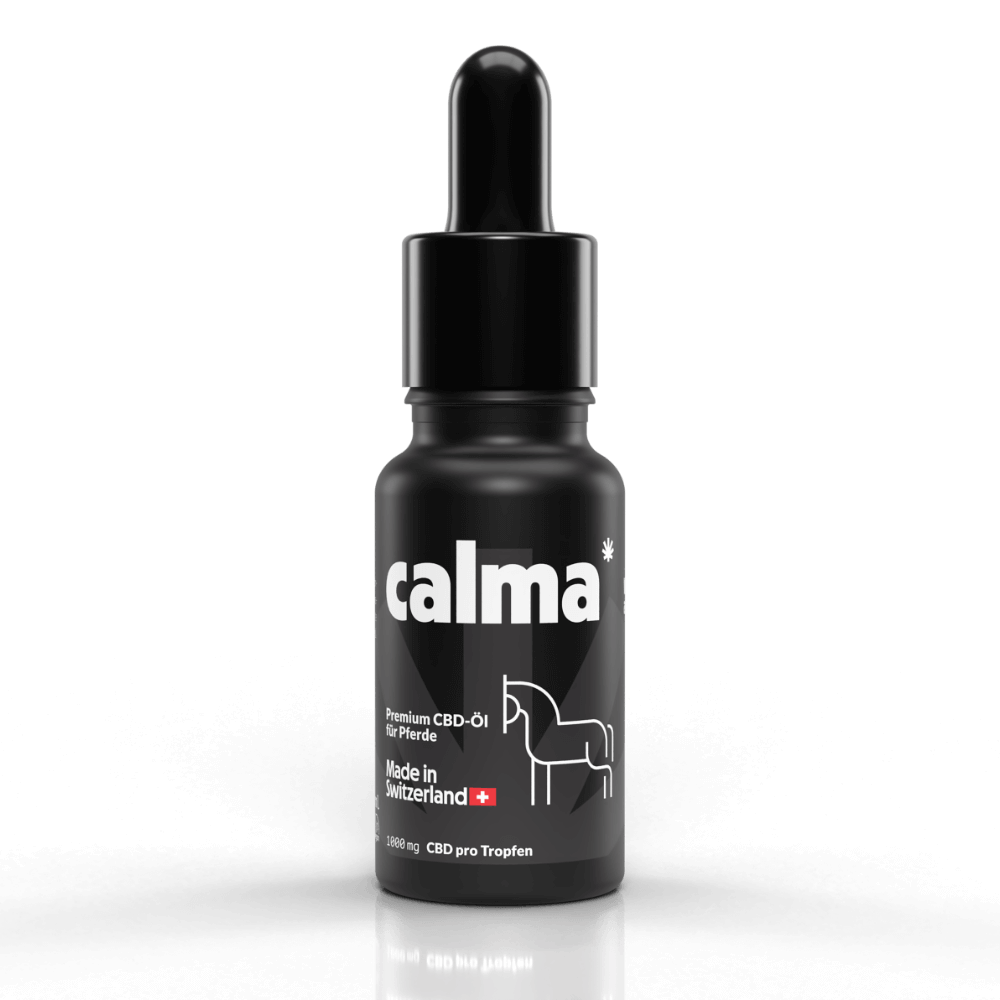
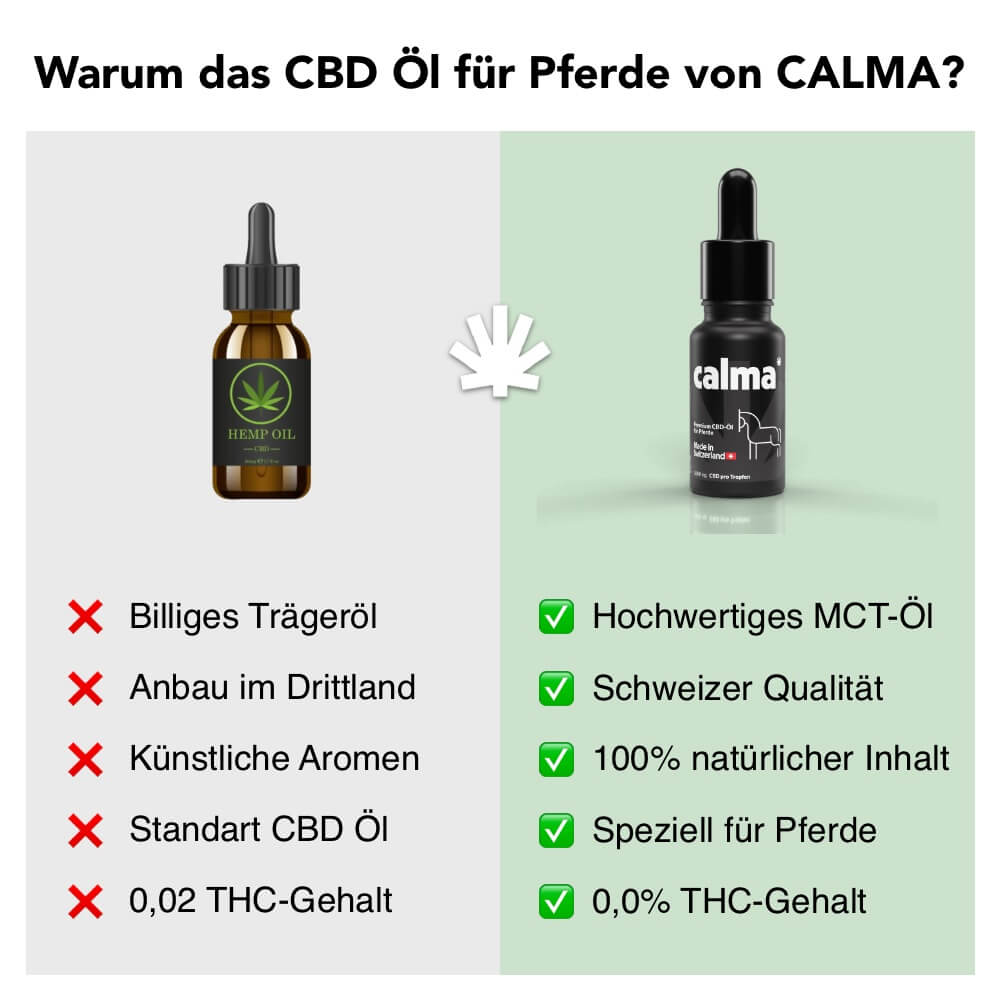
Leave a comment
All comments are moderated before being published.
This site is protected by hCaptcha and the hCaptcha Privacy Policy and Terms of Service apply.